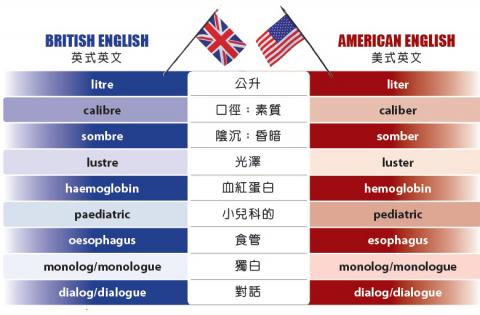In the Oct. 10 edition of American English and British English we looked at the simplification of certain spelling conventions preferred by American lexicographer and reformer Noah Webster. These included the removal of the superfluous “u” in words such as colour, favourite and neighbour (to become color, favorite and neighbor) and the changing of the ending “-ce” to a more representative “-se” in words such as defense and license.
There are other spelling conventions followed in American English after Webster’s changes that differ from those still used in British English. These include the “-er” ending to replace the “-re” ending in words such as fiber (fibre), meter (metre), center (centre) and theater (theatre), and the dropping of the redundant “a” or “o” in words such as anemia (anaemia), diarrhea (diarrhoea), encyclopedia (encyclopaedia) and archeology (archaeology).
Another difference is observed in words ending in -ogue, such as analogue and catalogue, which have the variants analog and catalog. These are essentially alternative spellings of the same word. While the use of “o” instead of the British “ou” in words like colour is now standardized, both “-og” and “ogue” are possible in American and British English, although the Americans prefer analog and catalog, the British analogue and catalogue.

(Paul Cooper, Taipei Times)
在十月十日刊出的美式&英式英文單元,我們審視了美國字典學家暨改革者諾亞‧韋伯斯特偏好的某些拼音慣例之簡化。這些包括移除在colour、favourite、neighbour等字裡多餘的字母「u」(簡化為color、favorite、neighbor),和字尾「-ce」轉變為更能代表其發音的「-se」,例如defense、license等字。
而在美式英文中還有其它的拼音慣例,經由韋伯斯特的更動,變得和仍在使用的英式英文有所不同。這些包括以字尾「-er」取代字尾「-re」,例如fiber(fibre)、meter(metre)、center(centre)、theater(theatre)這些字,及省略字裡累贅的字母「a」或「o」,例如anemia(anaemia)、diarrhea(diarrhoea)、encyclopedia(encyclopaedia)、archeology(archaeology)這些字。
另一差異則可在字尾「-ogue」的字被觀察到,像是英式拼音analogue、catalogue等字的變體為analog、catalog,它們基本上算是同樣單字的不同拼法。對於像colour這些字來說,使用「o」而非英式的「ou」現今已被視為合乎標準,不過「-og」和「-ogue」在美式和英式英文中均有可能出現,雖然美國人還是偏好使用analog、catalog,而英國人則偏好analogue、catalogue。
(台北時報張聖恩譯)

Computex, Asia’s biggest electronics conference, kicked off Monday in Taipei, and as in years past drew industry chieftains from Nvidia Corp.’s Jensen Huang and Qualcomm Inc.’s Cristiano Amon to Young Liu of Foxconn, which makes the bulk of the world’s iPhones and Nvidia servers. But while last year’s event was a celebration of the post-ChatGPT AI boom, executives this time are likely grappling with the uncertainty of the Trump administration’s effort to reshape the global trade order — disrupting a decades-old model for tech manufacturing. This year’s exhibition will of course feature the hardware required to bring artificial intelligence to life.

For many people, allergies are an all-too-familiar annoyance. The constant sneezing, itching, and watery eyes are just a few clear signs of allergies, which is a surprisingly common condition affecting millions worldwide. But what exactly triggers these reactions, and how can we cope with them? Allergies arise from a misunderstanding between our immune system and seemingly harmless substances. Under normal circumstances, the immune system acts as our body’s personal bodyguard, diligently identifying and eliminating threats like viruses and bacteria. However, in individuals with allergies, the immune system mistakenly identifies certain substances, called allergens, as invaders. This triggers a reaction, leading to

A: South Korean supergroup BTS member J-Hope, EXO member Xiumin and other various artists are set to tour Taiwan. B: Is J-Hope the first BTS member to visit as a solo singer? A: Yup, he’s going to stage two shows in Taoyuan over the weekend. B: All BTS fans, nicknamed “ARMY,” must be so happy. I wonder when the seven-member group can finally stage a comeback again. A: Well, the good news is the five members currently performing military service will all leave the army next month. So the fans’ long wait is about to end. A: 南韓天團防彈少年團BTS的J-Hope,和EXO的Xiumin等多位熱門歌手最近都要來台開唱。 B:

A: Apart from BTS’ J-Hope and EXO’s Xiumin, Hong Kong singer Eason Chan is holding six concerts in Kaohsiung. B: And versatile British musician Jacob Collier is visiting Taiwan for the first time, performing in New Taipei City tonight. A: US singer Lauv and rock band LANY will also stage individual shows in Kaohsiung next week. B: Plus, Singaporean singer JJ Lin will hold two concerts at the Taipei Dome in early June. A: Which show are you going to? A: 除了BTS的J-Hope和EXO的Xiumin,香港歌王陳奕迅正在高雄熱唱6場。 B: 而多才多藝的英國歌手雅各柯里爾首度訪台,今晚即將在新北開唱! A: 美國歌手洛夫、搖滾樂團藍尼下週也分別在高雄演出。 B: 此外新加坡歌王林俊傑則將於6月初,首次挑戰台北大巨蛋嗨唱兩場。 A: 你想去聽誰的演唱會? (By Eddy Chang, Taipei Times/台北時報張迪)